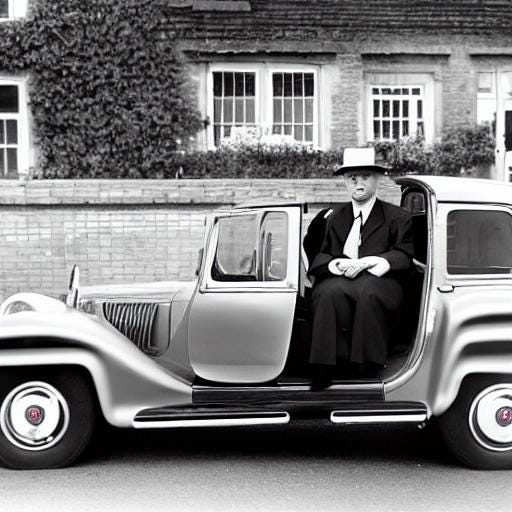Mr. Benn's Ethical Drive: Steering Through AI with Lessons from the Road
Exploring the Crossroads of Artificial Intelligence and Automotive History
Once more, Mr Benn found himself stepping out from the familiar surroundings of 52 Festive Road, embarking on a curious journey. Today's adventure takes him through the doors of his magical costume shop, and into the intricate and evolving realm of generative AI. It’s a world filled with wonder and potential as were the early days of motoring, yet it also faces similar ethical crossroads.
Context: Parallel Roads: The Evolution of Motoring and AI Ethics
The motor car, when it first graced our roads, was a sight to behold. Yet, it brought with it challenges that needed navigating. Today, generative AI stands at a similar juncture, promising yet fraught with ethical complexities.
Lessons from Motoring's History
1. Introduction of Indicators: Just as indicators on cars provided a means to communicate intentions, transparency in AI algorithms is crucial for understanding and trusting AI decisions.
2. Speed Limits for Safety: Speed limits were introduced to keep roads safe. In AI, this translates to regulating the pace of AI deployment, ensuring it is safe and ethical before widespread use.
3. The Seat Belt of Data Privacy: The introduction of seat belts revolutionized car safety. Similarly, robust data privacy measures are the 'seat belts' of AI, crucial for user safety.
4. Drink Driving Laws and AI Accountability: Strict laws against drink driving increased accountability. In AI, clear guidelines are needed to determine who is accountable for AI decisions – the developers, the users, or the AI itself.
5. Speed Bumps - Slowing Down for Caution: The introduction of speed bumps made drivers slow down in sensitive areas. Similarly, in AI development, we need 'speed bumps' - checkpoints where we assess ethical implications and societal impact.
Vignette: But which side of the road should we drive on?
The decision on which side of the road to drive on has evolved over time and varies by country. This practice dates back centuries and has roots in historical and cultural factors.
Historically, the majority of people are right-handed, and in the past, when riders and horse-drawn carriages were common, traveling on the left side of the road was more practical and safer. This allowed riders to have their right hand free to greet others or defend themselves with a sword.
The shift in some countries to driving on the right is often attributed to practical reasons related to specific types of wagons and later, to the design of certain vehicles. For instance, in France, a decree of 1792 started the move towards right-hand traffic, and Napoleon's conquests spread this system across Europe.
In contrast, the United Kingdom and its former colonies, including India, Australia, and South Africa, continue to drive on the left. This practice has been maintained since the times when horse-drawn vehicles were common.
The United States adopted right-hand driving in the late 1700s and early 1800s, partially influenced by the design of freight wagons drawn by large teams of horses. The driver sat on the rear left horse, so it was easier to drive on the road's right side to see oncoming traffic.
Image credit: Dall-e
There isn't a single date when the world decided which side of the road to drive on; it evolved differently in different places, influenced by a mix of historical, cultural, and practical factors.
Conclusion: The Road to AI Ethical Maturity
As with cars, the journey to make AI ethical and user-friendly is ongoing. The introduction of seat belts, speed limits, and other regulations made driving safer and more accessible. We are now at a point where we must develop similar 'safety features' for AI.
As Mr Benn hangs up his metaphorical hat on returning to Festive Road, we ponder the parallels between the evolution of cars and AI. We have the opportunity to learn from the past and navigate AI towards a future that is not only innovative but also safe and ethical. Let's embrace this journey with the wisdom of our motoring history, ensuring AI is a tool that benefits all, just as the car eventually has.
Author’s note:
This blog post enriches the AI Ethics narrative by drawing parallels between the evolution of car safety features and the ethical development of AI, offering a thoughtful perspective that aligns with Mr. Benn's imaginative and insightful character from which society may take notice.
Final Thought: what other parallels do you draw? What about driving licences? Should we introduce the equivalent for users of generative AI? If not, why not?
About Mr Benn
"Mr. Benn" is a British animated children's television show that originally aired in the early 1970s. It was created by David McKee.
Mr. Benn is the main character of the show. He is a man who lives in a city, at number 42, Festive Road (actually David McKee lived at 54, Festing Road, Putney).
Every episode follows a similar theme. Mr. Ben leaves his house, dressed in a business suit and bowler hat, and visits a magical costume shop where he is invited by the shopkeeper to try on a costume. He leaves through the changing room's second door, which always leads to an adventure relevant to the costume he is wearing, such as a knight, a clown, or a spaceman.
At the end of each adventure, a mysterious figure (usually the shopkeeper in disguise) appears and returns Mr. Ben to the costume shop, and he then returns to his normal life.
The episodes are remembered for their distinctive narrative style, where the narrator explains Mr. Ben's adventures as they unfold. The series has had a lasting impact, and has been widely Recognised as a classic of British animation. It has a strong nostalgic appeal for many who grew up watching it and not least myself, who went on to ‘seek’ my own adventures very much in the ‘dipping in and out’ way that Mr Ben taught us to do.
In tribute to him, and by way of sone form of apology to anyone who has got caught up in my adventurous approach to life, here’s a series of adaptations that may ignite a rerun of the series, at least in our own minds.
Nadio Granata
14th
25th November 2023
About Nadio Granata FCIM, FHEA
Nadio Granata is the founder of the AI Collective and co-founder of Age of Human Think Tank. He is a published author, senior academic, lead academic on the CIM Level 6 Specialist Award in AI Marketing for the Cambridge Professional Academy and evangelist for the democratisation of AI. You can discover more about him here: http://nadio.ai
#AskNadio is his customised, generative AI trained personal assistant.








